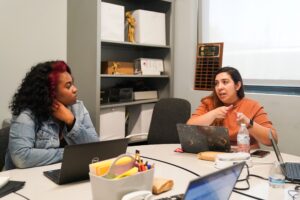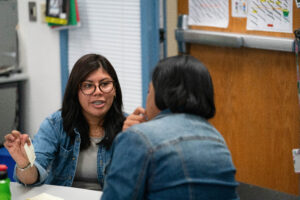Education was a second career for me—but it wasn’t for lack of trying to make it the first. In college, I pursued a major in education for one semester, but became discouraged by the striking absence of Black men and women in the program. I also heard so much about looming obstacles like certification tests that had tripped up people I was certain would make great teachers. I just couldn’t see a path to a career in the classroom, so I changed course. I went on to become a social worker, but eventually found my way back to education when I founded an alternative school for boys, and later Delaware’s first single-gender charter school for boys.
But far too many aspiring Black teachers who encounter steep barriers to the profession—from the sheer cost of completing training, to licensure tests that disproportionately screen them out despite saying little about their teaching ability, to a lack of support and camaraderie during their crucial early years in the classroom—never find their way past them. It’s one of the main reasons 80 percent of the nation’s teacher workforce is white, even though more than half of public school students are people of color. This teacher diversity gap is an urgent challenge for school systems across the country, with a growing body of research showing that racial diversity in the teacher workforce is especially important—for all students, but especially for students of color.
At TNTP, we’ve made diversity a top priority in our teacher training programs, even as we’ve maintained one of the highest standards in the country for earning certification. We’re proud that more than two-thirds of our program participants this past summer identified as people of color. But in 2019, we launched a pilot program—the Black Educator Excellence Cohort (BEEC)—to tackle the barriers keeping aspiring Black teachers out of the profession more directly than we ever had before. By combining targeted financial aid, support with testing and certification, and a network of mutual support to counteract the isolation many Black teachers feel on mostly white teaching staffs, we hoped to boost the number of Black teachers who complete our training and remain in the classroom.
BEEC currently operates as part of our training programs in three cities (Baltimore, Indianapolis, and Greater New Orleans) and in a district-run program supported by TNTP (Charlotte) where the shortage of Black teachers is an especially urgent problem. The program provides:
- Transition funding to help cover expenses during summer training
- Certification testing support, including tutoring and partial testing fee reimbursement
- Partial tuition reimbursement for certification coursework
- Additional opportunities for training and enrichment throughout the first two years in the classroom
- Networking and fellowship with a supportive community of new and established Black educators
Each site worked hard to build a community that met the unique needs of its participants. For example, Charlotte cohort members participated in a virtual book study of We Got This by Cornelius Minor. Indianapolis cohort members participated in a monthly “Chat & Chew” series that featured a shared meal and a guest speaker on a topic with special relevance to the Black educator community. The New Orleans cohort attended a “Happy and Healthy Black Educators” series to connect with Black leaders in the New Orleans community. In Baltimore, cohort members were matched with mentor teachers who earned their certification through our program, and reflected on cultivating emotional resilience by reading Elena Aguilar’s Onward.
The early outcomes from BEEC have been promising, even with the added challenges of the COVID-19 pandemic. Across all our programs, the number of Black participants who successfully completed their training has nearly doubled over the last two years, from 133 in 2018 to 253 this past summer. And among BEEC cohort members, 88 percent completed their first full year in the classroom, compared to 81 percent of our Black Fellows the previous year.
Just as importantly, we’ve heard directly from BEEC participants that the program has made a big difference for them—in fact, 97 percent told us BEEC activities supported their teaching practice, and two-thirds told us they likely would not have finished their training without the program.
“I really appreciate the initiative taken by the BEEC as well as the opportunity to be a part of it. It is great that the organization is here to recognize and support Black educators and it has felt great to have that as a new teacher,” said a New Orleans cohort member. “It has been a reminder for me how important it is to feel seen as a person of color and it has allowed me to make sure my students feel seen as well.”
An Indianapolis cohort member agrees. “I feel like I have indeed found my village. [My cohort has] inspired and motivated me,” he said. “It has been a great experience for me I’m extremely excited about what the BEEC has in store for me and future cohorts.”
Our experience so far with the Black Educator Excellence Cohort shows that the right combination of financial assistance and community building can dramatically improve recruitment and retention of teachers of color. It’s an approach other programs should consider to help more aspiring Black teachers navigate inequitable barriers to the classroom—although it’s no substitute for policy changes that replace those barriers with better standards rooted in classroom effectiveness. We’re excited to build on our progress and apply what we’ve learned more broadly across our programs, since we know the shortage of teachers of color in this country extends beyond just Black teachers. And we’ll continue to refine the BEEC experience the same way we built it in the first place: by listening to the needs and priorities of Black educators.








